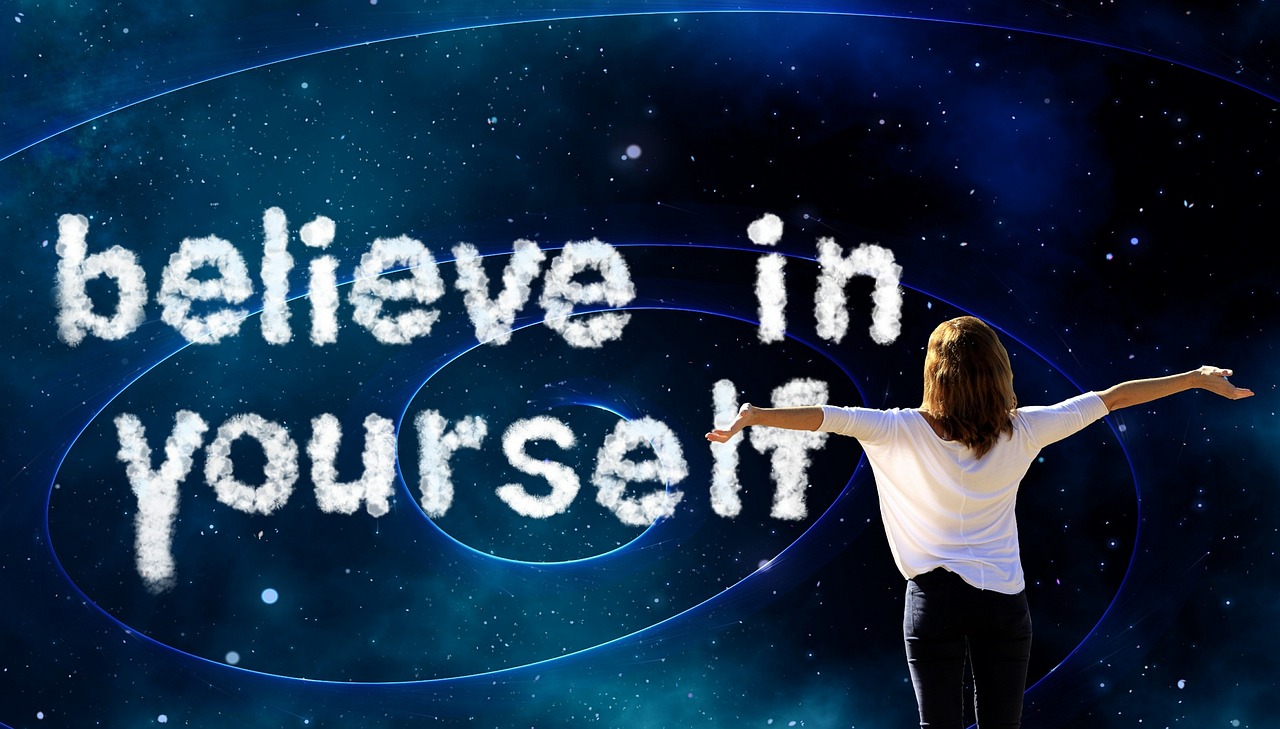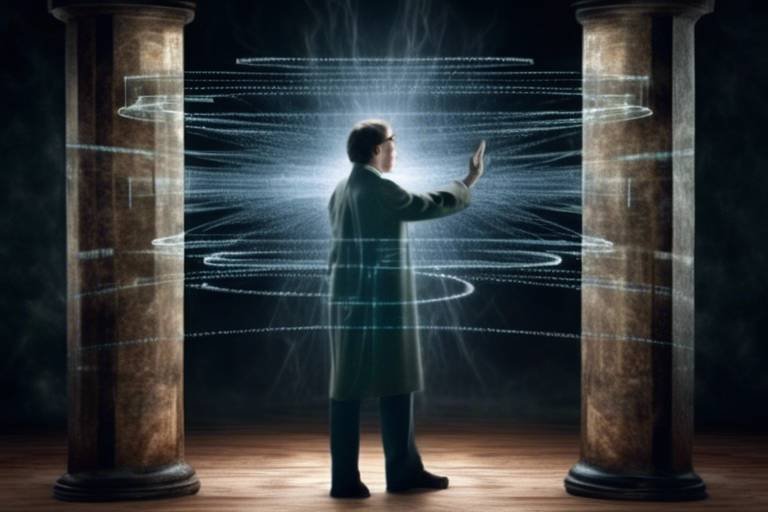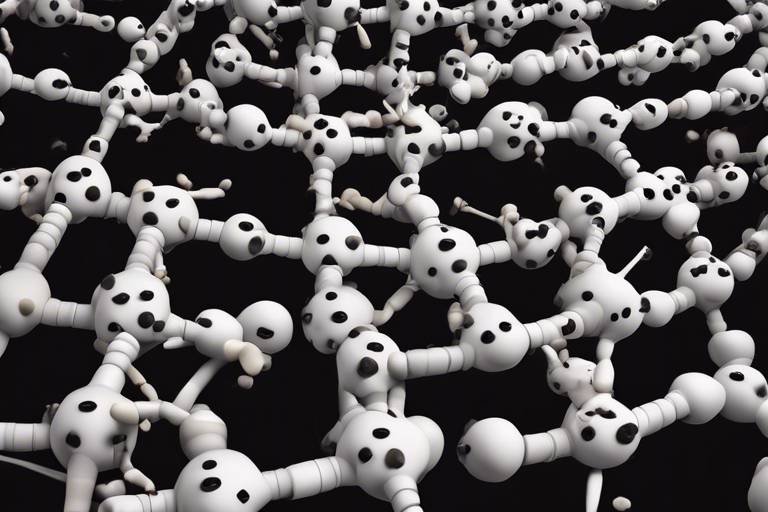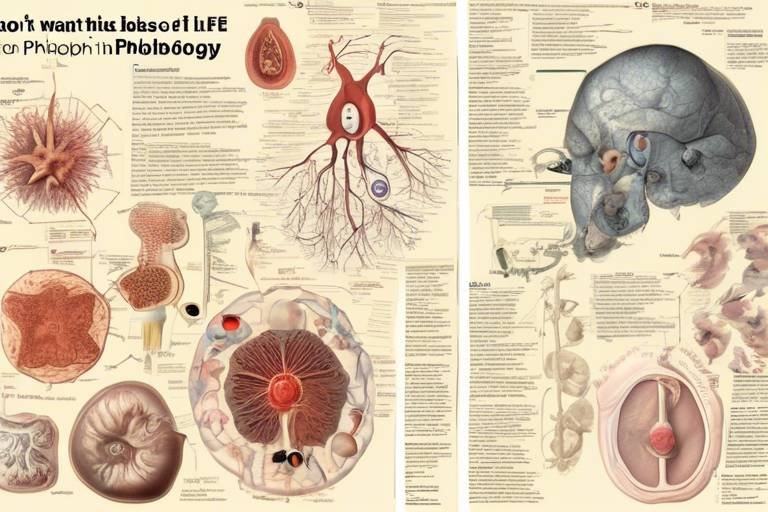Does Consciousness Emerge from Quantum States in the Brain?
Have you ever pondered the enigmatic nature of consciousness? What if I told you that some scientists believe it could be linked to the quantum world? This article explores the intriguing hypothesis that consciousness may arise from quantum processes within the brain, examining scientific theories, research findings, and philosophical implications surrounding this controversial topic. Consciousness is not just a mere byproduct of brain activity; it might be a complex interplay of quantum mechanics and neural functions. Now, let’s dive deeper into this fascinating intersection of science and philosophy.
To grasp the idea of consciousness emerging from quantum states, we first need to understand what consciousness itself is. It’s a term that has puzzled scientists and philosophers alike for centuries. Is it merely our awareness of thoughts and surroundings, or does it encompass something deeper? Definitions vary widely, from the simple acknowledgment of sensory experiences to the profound sense of self and identity. This ongoing debate leads us to question: can we truly define consciousness, or is it something that transcends definition?
Many theories exist, ranging from the biological and neurological to the philosophical. For instance, some argue that consciousness is a product of complex brain processes, while others suggest it could be a fundamental aspect of the universe itself. This foundation sets the stage for exploring the quantum brain hypothesis, which posits that quantum mechanics might play a crucial role in our conscious experience.
Now, let’s talk about the quantum brain hypothesis. This idea suggests that the brain operates not just on classical physics principles but also on quantum mechanics, which could fundamentally alter our understanding of cognition and consciousness. Proponents of this theory, such as physicist Roger Penrose and anesthesiologist Stuart Hameroff, argue that quantum events in brain microtubules could correlate with conscious experience. But what does that mean for us? It implies that our thoughts and decisions might be influenced by quantum phenomena, leading to a new frontier in neuroscience.
Among the significant theories in this realm is the Orchestrated Objective Reduction (Orch-OR) theory proposed by Penrose and Hameroff. This theory suggests that consciousness arises from orchestrated events of quantum state reductions within brain microtubules. In other words, it’s a dance of quantum particles that might give rise to our conscious experience. Imagine if the very fabric of our thoughts was woven from the threads of quantum mechanics! This theory provides a fascinating bridge between quantum physics and neuroscience, raising questions about the nature of reality and our place within it.
Let’s break down the Orch-OR theory a bit further. According to Penrose and Hameroff, microtubules—structures within neurons—could facilitate quantum computations. These computations may lead to moments of conscious awareness. Think of microtubules as tiny processors, where quantum bits (qubits) interact and collapse into a state that produces a conscious thought. This idea is not just a whimsical notion; it attempts to explain how consciousness could emerge from the underlying quantum substrate of the brain.
However, not everyone is on board with the Orch-OR theory. Critics argue that there are significant scientific challenges to its claims. For instance, the brain operates at a warm temperature, which might disrupt delicate quantum states. Additionally, alternative explanations for consciousness, such as emergent properties of complex systems, do not rely on quantum mechanics. This raises an important question: Is it possible that consciousness can be explained without invoking the quantum realm at all?
So, what does the empirical research say about the quantum brain hypothesis? Studies in quantum biology have shown that quantum effects can play a role in processes like photosynthesis and avian navigation. However, direct evidence linking quantum mechanics to consciousness remains elusive. This lack of concrete evidence leaves the scientific community divided, with some researchers advocating for further exploration, while others remain skeptical.
The implications of linking consciousness to quantum states are profound. If consciousness is indeed a quantum phenomenon, it challenges our understanding of free will, identity, and the very nature of reality. Are our decisions predetermined by quantum events, or do we possess true agency? This leads us to explore the relationship between quantum mechanics and free will, raising questions about the essence of human experience.
Could quantum mechanics influence our concept of free will? Some theorists argue that the inherent unpredictability of quantum events could provide a basis for free will, suggesting that our choices are not entirely deterministic. This perspective opens up a fascinating dialogue: if our consciousness is shaped by quantum processes, does that mean our decisions are influenced by the randomness of the quantum world?
As we look to the future, the relationship between quantum mechanics and consciousness remains a rich field for exploration. Interdisciplinary studies combining neuroscience, physics, and philosophy could pave the way for groundbreaking discoveries. Imagine a world where we can finally unravel the mysteries of consciousness, bridging the gap between the mind and the quantum realm. The journey ahead promises to be as exciting as it is complex!
- What is consciousness? Consciousness refers to our awareness of thoughts, feelings, and surroundings, encompassing both subjective experience and self-identity.
- What is the quantum brain hypothesis? This hypothesis suggests that quantum mechanics plays a crucial role in cognitive functions and consciousness.
- Who proposed the Orch-OR theory? The Orch-OR theory was proposed by physicist Roger Penrose and anesthesiologist Stuart Hameroff.
- What are the critiques of the Orch-OR theory? Critics argue that scientific challenges exist, such as the warm temperature of the brain disrupting quantum states.
- What are future research directions? Future research may include interdisciplinary studies that explore the intersection of neuroscience, physics, and philosophy.

Understanding Consciousness
Consciousness, a term that has puzzled scientists and philosophers alike, is often described as the state of being aware of and able to think about one's own existence, thoughts, and surroundings. But what does it really mean to be conscious? Is it merely a byproduct of brain activity, or is there something more profound at play? The debate surrounding consciousness is as vibrant as it is complex, with various definitions and interpretations emerging from different fields of study.
At its core, consciousness can be seen as a multi-faceted phenomenon. Some might argue that it encompasses everything from basic awareness to profound self-reflection. For instance, consider how you feel when you're lost in thought versus when you're fully engaged in a conversation. In the former, you may be aware of your surroundings but not actively processing them, while in the latter, you're dynamically interacting with the world around you. This illustrates the varying levels of consciousness that we experience daily.
The scientific community has long grappled with the question of consciousness. Neuroscientists focus on the brain's mechanisms, attempting to pinpoint the neural correlates of conscious experience. Meanwhile, philosophers delve into the metaphysical implications, pondering questions of identity, free will, and the nature of reality itself. This intersection of science and philosophy creates a rich tapestry of ideas, with each discipline offering unique insights into the complex nature of consciousness.
One of the most compelling aspects of the consciousness debate is the hard problem of consciousness, a term coined by philosopher David Chalmers. This problem highlights the difficulty of explaining why and how subjective experiences arise from physical processes in the brain. For example, why does the firing of neurons in the brain lead to the vivid experience of seeing the color red or feeling happiness? This question remains largely unanswered, fueling ongoing research and speculation.
As we explore the nature of consciousness, it becomes clear that it is not merely a binary state of being awake or asleep. Consciousness exists on a spectrum, and understanding this spectrum is crucial for any discussion about its origins, particularly in relation to quantum mechanics. By examining various theories and hypotheses, we can begin to unravel the intricate web of consciousness and its potential connections to the fabric of reality.
In summary, consciousness is a deeply enigmatic and multifaceted phenomenon that challenges our understanding of the mind and its relationship to the physical world. As we delve deeper into this subject, we must remain open to various perspectives, recognizing that both scientific inquiry and philosophical exploration are essential to grasping the essence of what it means to be conscious.

The Quantum Brain Hypothesis
The quantum brain hypothesis is a captivating idea that suggests our consciousness might not just be a product of classical brain activity, but rather, it could be significantly influenced by the principles of quantum mechanics. Imagine your brain as a complex orchestra, where each neuron plays its part in harmony. Now, what if some of those notes are played not just in the classical sense, but through the mysterious and often counterintuitive realm of quantum physics? This hypothesis posits that quantum phenomena could be integral to cognitive functions, potentially offering insights into the very nature of consciousness itself.
At the heart of this hypothesis is the notion that certain processes occurring in our brain might be governed by quantum mechanics. Proponents argue that the brain's microtubules—tiny structures within cells—could function as quantum computers, processing information in ways that classical systems cannot. This perspective challenges the traditional view of neuroscience, suggesting that our thoughts, feelings, and decisions might be influenced by quantum states. It's like suggesting that while the brain is a powerful computer, it might also have a hidden dimension, a quantum layer that adds complexity to our understanding of consciousness.
Key figures in this field, such as physicist Roger Penrose and anesthesiologist Stuart Hameroff, have championed this theory. They argue that consciousness arises from orchestrated quantum events within the brain's microtubules, leading to the idea that our mental experiences could be tied to quantum states. This connection raises profound questions: If consciousness is indeed a quantum phenomenon, what does that say about the nature of reality? Are we merely biological machines, or is there something more mystical at play? These questions keep researchers and philosophers alike on the edge of their seats.
However, the quantum brain hypothesis is not without its critics. Some scientists argue that the brain is too warm and noisy for delicate quantum states to exist, suggesting that any quantum effects would be quickly disrupted. Others propose alternative explanations for consciousness that do not rely on quantum mechanics, emphasizing the importance of classical processes. This ongoing debate is reminiscent of a high-stakes chess game, where each side presents compelling arguments, leaving observers pondering the ultimate truth behind consciousness.
In summary, the quantum brain hypothesis opens up a fascinating dialogue about the intersection of quantum mechanics and consciousness. It challenges us to rethink our understanding of the mind and the universe, suggesting that the answers may lie in the uncharted territories of quantum physics. As we delve deeper into this hypothesis, we may find that consciousness is not just a byproduct of neural activity, but a complex dance of quantum states, waiting to be explored.
- What is the quantum brain hypothesis? The quantum brain hypothesis suggests that quantum mechanics may play a crucial role in the functioning of the brain and the emergence of consciousness.
- Who are the main proponents of this theory? Key figures include physicist Roger Penrose and anesthesiologist Stuart Hameroff, who propose that quantum processes in microtubules contribute to consciousness.
- What are microtubules? Microtubules are structural components of cells that may potentially serve as sites for quantum processing in the brain.
- What are the criticisms of the quantum brain hypothesis? Critics argue that the warm, noisy environment of the brain is unsuitable for maintaining quantum states, challenging the validity of the hypothesis.
- How does this hypothesis impact our understanding of free will? If consciousness has quantum roots, it may imply a level of unpredictability in decision-making, influencing traditional views on free will and determinism.

Key Theories in Quantum Consciousness
The intersection of quantum mechanics and consciousness is a captivating realm that has sparked intense debate and research. At the heart of this discourse are several key theories that attempt to elucidate how quantum processes could be linked to our conscious experience. One of the most notable theories is the **Orchestrated Objective Reduction** (Orch-OR) theory, proposed by physicist Roger Penrose and anesthesiologist Stuart Hameroff. This theory posits that consciousness arises from quantum computations occurring in the brain's microtubules, which are structural components of neurons.
To understand the Orch-OR theory, it's essential to grasp the fundamental concepts of quantum mechanics that it draws upon. Quantum mechanics suggests that particles can exist in multiple states simultaneously, a phenomenon known as **superposition**. The Orch-OR theory claims that these superpositions can collapse into definite states through a process called **objective reduction**, which is not merely random but orchestrated. This orchestration is what Penrose and Hameroff argue gives rise to conscious thought and experience.
Moreover, the Orch-OR theory is compelling because it attempts to bridge two seemingly disparate fields: neuroscience and quantum physics. It suggests that our conscious experience is not just a byproduct of neural activity but is fundamentally tied to the quantum realm. This bold assertion challenges traditional views of consciousness as merely an emergent property of complex neural networks.
In addition to Orch-OR, there are other theories that explore the concept of quantum consciousness. For instance, the **Quantum Mind** theory proposes that cognitive processes are inherently quantum in nature. This theory suggests that the brain operates using quantum information, which could potentially explain phenomena like intuition or creativity that seem to elude classical explanations. Some proponents of this theory argue that quantum entanglement might play a role in how we connect thoughts and ideas, creating a rich tapestry of conscious experience.
While these theories are intriguing, they are not without their challenges. Many scientists remain skeptical, arguing that the brain's warm, wet environment is not conducive to quantum states, which typically require isolation from external interactions. However, recent studies in quantum biology suggest that certain biological processes, like photosynthesis in plants, may indeed operate on quantum principles. This has opened the door for further exploration into how similar processes might exist in the human brain.
As we delve deeper into these theories, it becomes clear that the relationship between quantum mechanics and consciousness is not merely a scientific question but a profound philosophical inquiry. It raises essential questions about the nature of reality, the essence of self, and the very fabric of existence. Are we merely biological machines, or is there something more, something quantum, that constitutes our consciousness? The answers to these questions could redefine our understanding of what it means to be human.
In conclusion, the theories surrounding quantum consciousness, particularly the Orch-OR theory, present an exciting frontier in both science and philosophy. As research continues, we may uncover more about the intricate dance between the quantum world and our conscious experience, potentially leading to revolutionary insights about the mind and its place in the universe.

Orch-OR Theory Explained
The Orchestrated Objective Reduction (Orch-OR) theory is a fascinating and ambitious attempt to explain the emergence of consciousness through the lens of quantum mechanics. Developed by renowned physicist Roger Penrose and anesthesiologist Stuart Hameroff, this theory posits that consciousness arises from quantum computations occurring within the microtubules of neurons. Microtubules are structural components of the cytoskeleton, and according to Orch-OR, they serve as the site where quantum events can influence cognitive functions.
At its core, the Orch-OR theory suggests that the brain operates not just on classical physics but also incorporates quantum phenomena. This is a radical departure from traditional views of neuroscience, which typically focus on biochemical processes. The theory asserts that when quantum states in the microtubules reach a certain threshold, they undergo a process called objective reduction. This reduction is not merely a collapse of a wave function, as in standard quantum mechanics, but is proposed to be a fundamental process that leads to the emergence of conscious experience.
To better understand how Orch-OR connects quantum mechanics to consciousness, we can break down its main components:
- Quantum Superposition: Microtubules can exist in multiple states simultaneously, allowing for complex information processing.
- Objective Reduction: The transition from superposition to a single state is linked to conscious awareness, suggesting that our thoughts and decisions may stem from these quantum events.
- Orchestration: The term "orchestrated" refers to the idea that these quantum reductions are coordinated across the brain, contributing to a unified conscious experience.
One of the most compelling aspects of the Orch-OR theory is its potential to explain not only how consciousness arises but also why it feels the way it does. For instance, if consciousness is indeed a result of quantum processes, it might offer insights into the nature of subjective experience, or qualia. This could lead to a deeper understanding of what it means to be aware, to feel, and to think.
However, the Orch-OR theory is not without its challenges. Critics argue that the brain is too warm and noisy for delicate quantum states to be sustained, thereby questioning the feasibility of quantum processes in biological systems. Despite these criticisms, the theory has sparked significant interest and debate, pushing the boundaries of how we think about the intersection of physics, biology, and consciousness.
In summary, the Orch-OR theory offers a bold perspective on consciousness, suggesting that it emerges from the intricate dance of quantum mechanics within our brains. By bridging the gap between neuroscience and quantum physics, it opens up new avenues for research and understanding, paving the way for a future where the mysteries of consciousness may finally be unraveled.

Critiques of Orch-OR
While the Orch-OR theory proposed by Roger Penrose and Stuart Hameroff has garnered significant attention and sparked intriguing discussions, it is not without its fair share of criticisms. Many scientists and philosophers have raised concerns regarding the feasibility and empirical support of this hypothesis. One of the primary critiques revolves around the idea that quantum effects can be sustained in the warm, noisy environment of the brain. Critics argue that the brain's temperature and biochemical processes may be too disruptive for delicate quantum states to exist long enough to influence consciousness.
Furthermore, the Orch-OR theory posits that consciousness arises from orchestrated objective reductions of quantum states. However, skeptics question whether these reductions can truly be connected to conscious experience. They highlight the need for a more robust mechanism that links quantum events to the subjective nature of consciousness. In addition, some neuroscientists argue that there are already established neural correlates of consciousness that do not require quantum mechanics to explain. These alternative explanations suggest that consciousness could be understood through classical neuroscience without invoking the complexities of quantum theory.
Another significant critique is the lack of empirical evidence supporting the Orch-OR framework. While there have been some studies in quantum biology, the direct application of these findings to human consciousness remains tenuous at best. Critics contend that without concrete experimental validation, the Orch-OR theory risks being more philosophical speculation than scientific fact. This leads to a broader question: if consciousness can be explained through existing biological and neurological frameworks, is there any need to invoke quantum mechanics at all?
To summarize the critiques of the Orch-OR theory, we can look at the following key points:
- Quantum Coherence Challenges: The brain's environment may not support sustained quantum coherence.
- Connection to Consciousness: The link between quantum processes and subjective experience is unclear.
- Existing Neuroscience: Classical models may adequately explain consciousness without quantum mechanics.
- Lack of Empirical Evidence: There is insufficient experimental support for the Orch-OR hypothesis.
These critiques highlight the ongoing debate within the scientific community about the nature of consciousness and the potential role of quantum mechanics. As research continues, it is essential to approach the Orch-OR theory with a critical eye, weighing its implications against established scientific understanding and exploring alternative explanations that may offer a clearer picture of consciousness.
- What is the Orch-OR theory? The Orch-OR theory suggests that consciousness arises from orchestrated objective reductions of quantum states in the brain.
- Why do some scientists criticize the Orch-OR theory? Critics argue that quantum effects may not be sustainable in the brain's environment and that existing neuroscience can explain consciousness without quantum mechanics.
- Is there empirical evidence supporting the Orch-OR theory? Currently, there is a lack of direct empirical evidence linking quantum processes to consciousness.
- What are the implications of linking consciousness to quantum mechanics? If consciousness is linked to quantum mechanics, it could challenge our understanding of free will and the nature of reality.

Empirical Evidence
When we dive into the realm of surrounding the quantum brain hypothesis, we enter a fascinating landscape that blends science with the mysteries of consciousness. The quest to understand how consciousness arises has led researchers to explore various avenues, including the potential influence of quantum mechanics on our cognitive processes. But what does the evidence say? Are there concrete findings that support or challenge the idea that quantum states play a role in consciousness?
One of the most compelling areas of research is quantum biology, which examines how quantum phenomena might affect biological systems. For instance, studies have shown that certain biological processes, such as photosynthesis in plants and the navigation of birds, may involve quantum coherence. This suggests that quantum mechanics could be more prevalent in biological systems than previously thought. If quantum processes are indeed at play in these fundamental biological functions, could they also be influencing the complex operations of the brain?
Recent experiments have attempted to bridge the gap between quantum mechanics and neuroscience. For instance, researchers have explored the role of microtubules—tiny structures within neurons that are proposed to be the site of quantum activity—as potential mediators of consciousness. The work of Roger Penrose and Stuart Hameroff in developing the Orch-OR theory posits that these microtubules could facilitate quantum events that correlate with conscious experience. While this theory is controversial, it has sparked a wave of interest and experimentation aimed at uncovering the truth behind these claims.
However, it’s essential to approach this topic with a critical eye. Many scientists argue that the brain operates at a temperature and scale where quantum effects are unlikely to have a significant impact. The idea that consciousness arises from quantum states remains a contentious issue, and there are alternative explanations that do not invoke quantum mechanics. For example, traditional neuroscience offers models that explain consciousness through neural networks and biochemical processes without the need for quantum phenomena.
To illustrate the current state of empirical research, let’s take a look at some key studies and findings:
| Study | Findings | Implications |
|---|---|---|
| Quantum Coherence in Photosynthesis | Plants utilize quantum coherence to optimize energy transfer. | Suggests quantum processes are integral to biological functions. |
| Microtubule Quantum Effects | Proposed that microtubules can support quantum states. | Links quantum mechanics to potential consciousness mechanisms. |
| Neuroscience Models | Consciousness explained via neural networks and synaptic activities. | Challenges the quantum brain hypothesis. |
As we can see, the empirical evidence surrounding the quantum brain hypothesis is still evolving. While there are intriguing findings that hint at the possibility of quantum processes influencing consciousness, the scientific community remains divided. Some researchers are pushing forward with experiments to uncover more about how quantum mechanics might play a role, while others are advocating for more traditional approaches to understanding consciousness.
In summary, the journey to unravel the connection between quantum states and consciousness is fraught with challenges and debates. As more research emerges, it will be fascinating to see how this field develops and whether we can eventually bridge the gap between quantum physics and the profound mysteries of the human mind.
- What is the quantum brain hypothesis? The quantum brain hypothesis suggests that quantum mechanics may play a crucial role in the functioning of the brain and the emergence of consciousness.
- What is Orch-OR theory? Orchestrated Objective Reduction (Orch-OR) is a theory proposed by Roger Penrose and Stuart Hameroff that posits that consciousness arises from quantum events occurring in microtubules within neurons.
- Is there empirical evidence supporting quantum consciousness? While there are studies in quantum biology that suggest quantum processes are involved in biological functions, the evidence directly linking quantum states to consciousness is still debated and remains inconclusive.
- What are the criticisms of the quantum brain hypothesis? Critics argue that the brain's warm and wet environment is not conducive to sustaining quantum states and that traditional neuroscience provides sufficient explanations for consciousness without invoking quantum mechanics.

Philosophical Implications
The connection between consciousness and quantum states opens a Pandora's box of philosophical questions that challenge our understanding of existence itself. What does it mean to be conscious? Are our thoughts merely the result of biological processes, or do they stem from something deeper, perhaps even quantum phenomena? These inquiries have sparked debates among philosophers, scientists, and theologians alike, as they grapple with the implications of a quantum-based understanding of consciousness.
One of the most profound implications of linking consciousness to quantum mechanics is the question of free will. If quantum events are inherently probabilistic, does that mean our decisions are also influenced by randomness? This challenges the traditional notion of determinism, which posits that every event, including human actions, is determined by preceding events in accordance with natural laws. If consciousness emerges from quantum states, could it be that our choices are not as predetermined as we once thought? This notion leads us to ponder: Are we truly the architects of our destiny, or are we simply players in a cosmic game of chance?
Moreover, the idea that consciousness might be tied to the fundamental fabric of reality raises questions about identity. If our conscious experience is a product of quantum processes, how does this affect our sense of self? Are we merely a collection of quantum states, or is there something more substantial that defines who we are? This inquiry invites us to reflect on the nature of existence and the essence of being. It challenges the Cartesian dualism that has dominated philosophical thought for centuries, suggesting that the mind and body might not be as separate as previously believed.
Another intriguing aspect is the impact on our understanding of reality itself. Quantum mechanics has already shown us that the universe is not as straightforward as it seems. The idea that consciousness could play a role in shaping reality leads to a fascinating discussion about the observer effect—where the act of observation influences the outcome of a quantum event. If consciousness is intertwined with quantum processes, could it be that we are not just passive observers of reality, but active participants in its creation? This perspective encourages a more dynamic view of existence, where our thoughts and perceptions might shape the world around us.
In summary, the philosophical implications of consciousness emerging from quantum states are vast and complex. They challenge our long-held beliefs about free will, identity, and the nature of reality. As we delve deeper into this fascinating intersection of consciousness and quantum mechanics, we are compelled to reconsider what it means to be human in a universe that may be far more interconnected and mysterious than we ever imagined.
- What is the relationship between consciousness and quantum mechanics? The relationship suggests that consciousness may arise from quantum processes within the brain, leading to new insights about cognitive functions and self-awareness.
- Does quantum mechanics imply that we have free will? Quantum mechanics introduces elements of randomness, which complicates traditional views of determinism and raises questions about the nature of free will.
- How does this theory impact our understanding of identity? If consciousness is tied to quantum states, it challenges the notion of a fixed identity, suggesting that our sense of self may be more fluid and interconnected with the universe.
- What are the implications for our understanding of reality? The connection between consciousness and quantum mechanics may imply that observers play an active role in shaping reality, blurring the lines between perception and existence.

Quantum Mechanics and Free Will
When we dive into the deep waters of quantum mechanics and its implications for free will, we enter a realm that challenges our very understanding of decision-making and autonomy. Imagine standing at a crossroads, with two paths before you. In a classical deterministic world, every choice you make would be a predictable outcome of prior events, like a row of dominoes falling in a straight line. However, quantum mechanics introduces a level of uncertainty that could suggest our choices are not as predetermined as we once thought.
The crux of the matter lies in the uncertainty principle, which posits that certain pairs of physical properties, like position and momentum, cannot both be known to arbitrary precision. This inherent unpredictability raises intriguing questions about our conscious decisions. Are our choices simply the result of a complex web of neural processes, or is there an element of randomness that allows for true free will? Some theorists argue that this randomness at the quantum level might provide the necessary space for conscious decision-making to occur, making us more than just biological machines responding to stimuli.
Furthermore, consider the concept of superposition, where a quantum particle can exist in multiple states at once until it is observed. This idea can be metaphorically applied to human choices. Before making a decision, our minds might hold various possibilities in a state of superposition, and it is the act of decision-making that collapses these possibilities into a single outcome. This perspective suggests that our conscious awareness plays a critical role in shaping our reality, much like how an observer influences the behavior of quantum particles.
However, this perspective is not without its critics. Many argue that introducing quantum mechanics into the discussion of free will complicates the issue without providing clear answers. They contend that while quantum events are unpredictable, this does not equate to free will. Instead, what we perceive as free will may simply be a complex interplay of biological, psychological, and environmental factors. In this view, the randomness of quantum mechanics does not grant us the autonomy we seek; rather, it merely adds another layer of complexity to our understanding of consciousness.
As we explore these ideas, it becomes evident that the relationship between quantum mechanics and free will is still a hotly debated topic. Some researchers are advocating for interdisciplinary studies that bridge the gap between neuroscience, physics, and philosophy to further investigate how these fields can intersect to illuminate our understanding of consciousness and decision-making. The potential implications of such research are profound, as they could reshape our understanding of human agency and the nature of reality itself.
In conclusion, the question of whether quantum mechanics influences free will is as fascinating as it is complex. While quantum phenomena may introduce an element of unpredictability, whether this translates into genuine free will remains an open question. As we continue to unravel the mysteries of consciousness, we may find that the answers lie not only within the realms of physics and neuroscience but also in the philosophical implications of our existence.
- What is the quantum brain hypothesis? The quantum brain hypothesis suggests that quantum mechanics plays a crucial role in cognitive functions and consciousness.
- How does quantum mechanics relate to free will? Quantum mechanics introduces uncertainty and randomness, which some theorists believe may allow for true free will in decision-making.
- What is the Orch-OR theory? The Orch-OR theory, proposed by Penrose and Hameroff, posits that quantum events in the brain correlate with conscious experience.
- Are there criticisms of the quantum brain hypothesis? Yes, there are various criticisms, including scientific challenges and alternative explanations for consciousness that do not rely on quantum mechanics.

Future Directions in Research
As we stand on the precipice of a new era in understanding consciousness, the future directions in research are as exciting as they are complex. The interplay between quantum mechanics and cognitive functions invites a plethora of interdisciplinary studies that could reshape our understanding of the mind. Researchers are eager to dive deeper into the quantum brain hypothesis, exploring how quantum phenomena might illuminate the intricate workings of consciousness.
One promising avenue involves the integration of neuroscience, quantum physics, and philosophy. This collaborative approach could yield insights that are not only scientifically robust but also philosophically profound. For instance, interdisciplinary teams could conduct experiments that test the validity of quantum processes in brain activity, potentially revealing new dimensions of how we perceive reality.
Moreover, advancements in quantum biology are paving the way for innovative experiments. Researchers are beginning to investigate how quantum effects influence biological processes at the cellular level, which may have implications for understanding consciousness. A fascinating example is the study of photosynthesis, where quantum coherence has been observed. If similar mechanisms are found in neural processes, it could revolutionize our understanding of brain function.
In addition, there is a growing interest in utilizing advanced imaging techniques that can capture brain activity at unprecedented resolutions. This could allow scientists to observe potential quantum effects in real-time, providing empirical data that either supports or challenges the quantum brain hypothesis. Such studies could also help clarify the relationship between consciousness and various cognitive states, including altered states of awareness during meditation or deep sleep.
Furthermore, the philosophical implications of these findings cannot be overstated. As researchers probe deeper into the quantum underpinnings of consciousness, they may uncover answers to age-old questions about free will, identity, and the nature of reality itself. For instance, if consciousness is indeed linked to quantum states, what does that mean for our understanding of free will? Are our choices merely the result of quantum fluctuations, or do we possess a deeper agency?
To encapsulate these exciting prospects, here’s a brief overview of potential future research directions:
| Research Direction | Description |
|---|---|
| Interdisciplinary Collaborations | Combining neuroscience, quantum physics, and philosophy to explore consciousness. |
| Quantum Biology Studies | Investigating quantum effects in biological processes related to brain function. |
| Advanced Imaging Techniques | Utilizing cutting-edge technology to observe brain activity and potential quantum effects. |
| Philosophical Inquiry | Examining the implications of quantum consciousness on free will and identity. |
In summary, the future of research into the relationship between consciousness and quantum mechanics is brimming with potential. As we continue to unravel the mysteries of the mind, each discovery could lead us closer to answering some of the most profound questions about our existence. The journey is just beginning, and who knows what astonishing revelations await us?
- What is the quantum brain hypothesis? It is the theory that quantum mechanics plays a crucial role in cognitive functions and consciousness.
- How might quantum mechanics influence free will? If consciousness is linked to quantum states, it may challenge traditional notions of free will and determinism.
- What are some methods of studying quantum effects in the brain? Advanced imaging techniques and interdisciplinary collaborations are key methods being explored.
- Are there empirical studies supporting the quantum brain hypothesis? Yes, ongoing research in quantum biology and neuroscience is investigating these connections.
Frequently Asked Questions
- What is consciousness?
Consciousness is often described as the state of being aware of and able to think about one's own existence, thoughts, and surroundings. It's a complex and multifaceted concept that has puzzled scientists and philosophers alike. Some argue it's a byproduct of brain activity, while others believe it might be something more profound or even fundamental to the universe.
- How does the quantum brain hypothesis relate to consciousness?
The quantum brain hypothesis posits that quantum mechanics may play a significant role in how consciousness arises. Proponents suggest that quantum processes within the brain could influence cognitive functions, leading to the emergence of conscious experience. This idea is still highly debated and remains a controversial topic in both neuroscience and physics.
- What is the Orch-OR theory?
The Orchestrated Objective Reduction (Orch-OR) theory, proposed by physicist Roger Penrose and anesthesiologist Stuart Hameroff, suggests that consciousness arises from quantum computations in microtubules within neurons. They argue that these quantum events orchestrate cognitive functions, potentially linking the realms of quantum physics and neuroscience.
- What are the main criticisms of the Orch-OR theory?
Critics of the Orch-OR theory argue that it lacks empirical support and that the brain's warm, wet environment is not conducive to sustaining quantum states. Additionally, alternative theories suggest that consciousness can be explained through classical neuroscience without invoking quantum mechanics, leading many to question whether Orch-OR is a viable explanation.
- Is there any empirical evidence supporting the quantum brain hypothesis?
While some studies in quantum biology suggest that quantum effects may play a role in biological systems, direct evidence linking these effects to consciousness is still lacking. Research is ongoing, and as scientists delve deeper into the mysteries of quantum mechanics, they hope to uncover more about the potential connections between quantum phenomena and conscious experience.
- What are the philosophical implications of linking consciousness to quantum states?
Linking consciousness to quantum states raises profound philosophical questions regarding free will, identity, and the nature of reality. If consciousness is influenced by quantum mechanics, it might suggest that our thoughts and decisions are not entirely deterministic, opening up discussions about the nature of free will and how we perceive our own existence.
- How might quantum mechanics influence our understanding of free will?
Quantum mechanics introduces elements of randomness and uncertainty, which could imply that our conscious decisions are not purely determined by prior states. This challenges traditional notions of determinism, suggesting that there could be a level of unpredictability in our choices, potentially reshaping how we understand free will and moral responsibility.
- What are the future directions in research regarding consciousness and quantum mechanics?
Future research may explore interdisciplinary approaches, combining insights from neuroscience, physics, and philosophy to further investigate the relationship between quantum mechanics and consciousness. This could involve experimental studies aimed at understanding how quantum processes might influence brain function and conscious experience, ultimately deepening our understanding of both fields.



















